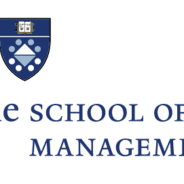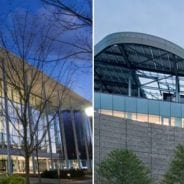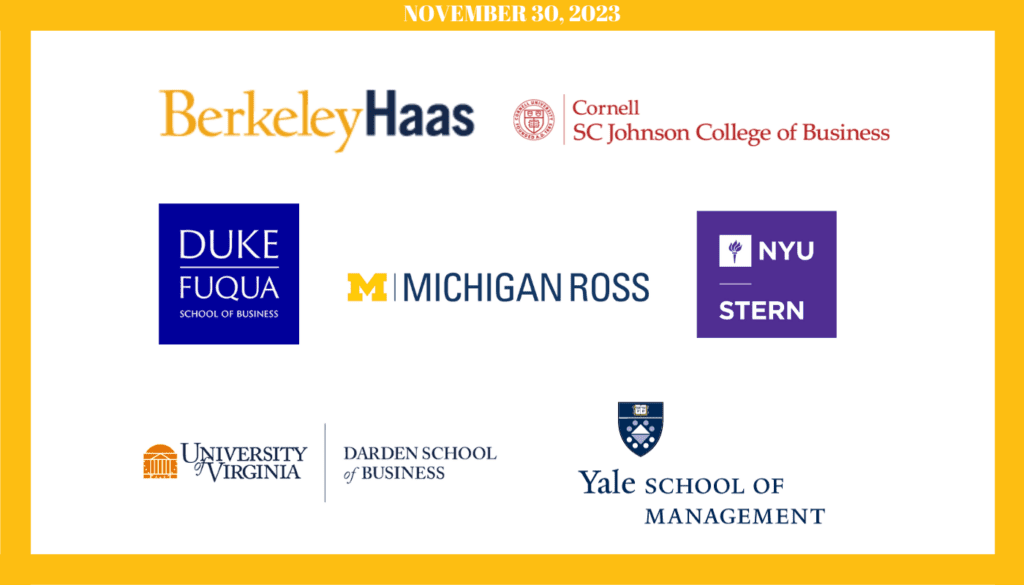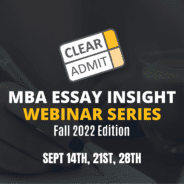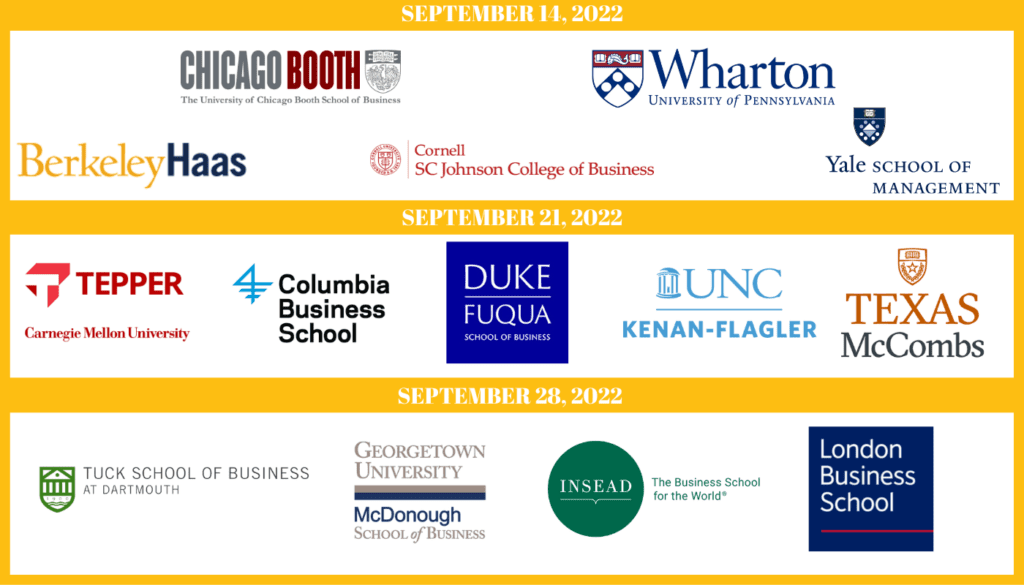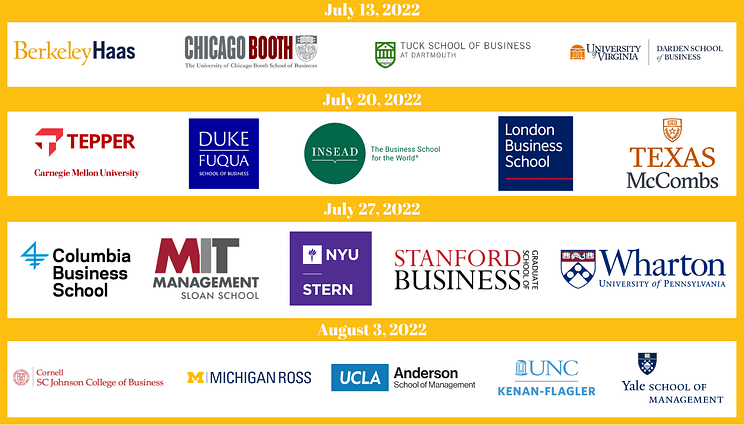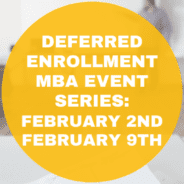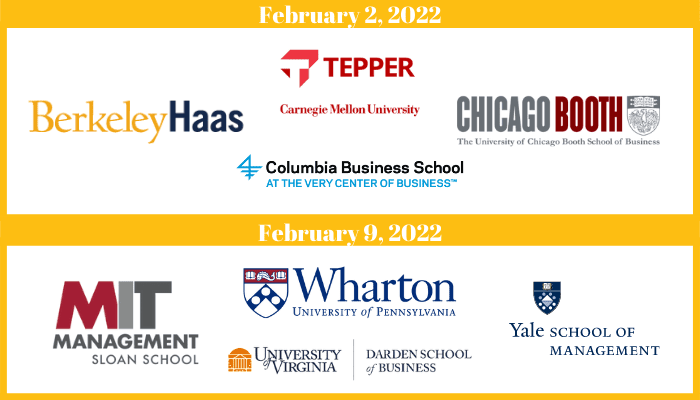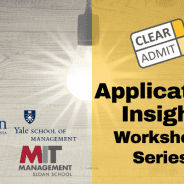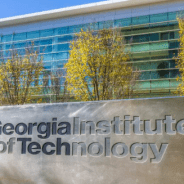Search results for yale som:
Military Visit Day @ Yale SOM
Thank you for your interest in coming to New Haven to see us. Below you will find the link to the application for our Military Visit Day. In addition to basic information, a resume and a statement of interest are required in the application. If you have any questions, please reach out to MBA Admissions.
Thursday, October 26th
12:00pm -1:00pm Lunch and Welcome
1:00pm – 5:00pm Sessions in Evans Hall
5:15pm – 6:00pm Reception
6:30pm – 8:00pm Dinner in New Haven
Friday, October 27th
10:00am Yale University Tour (optional)
Applications due: September 20 — APPLY HERE
We invite prospective students who serve or have served in the military to discover how you belong at Yale. Connect with current students and members of our Veterans Club, get a glimpse inside the Yale SOM experience, and gain counsel from Admissions Committee members as you prepare your MBA application. Applications are reviewed on a rolling basis; you will receive a decision no later than September 22.
Admitted candidates must then register to attend the event. The first 30 registrants will be offered a free hotel stay for the evening of Thursday, October 26.
Information provided in your application or registration to attend Military Visit Day will not be part of your MBA application to Yale SOM.
The Class of 2020 Begins at Yale SOM
In late August, the newest group of Yale School of Management Master of Advanced Management, Master’s Degree in Global Business, and Society (GBS), and Master’s Degree in Systemic Risk students officially began their Class of 2020 journey.
Yale SOM deans and faculty members introduced the 120 one-year Master’s students at the Edward P. Evans Hall’s Zhang auditorium. Formally introducing the new students, Deputy Dean Anjani Jain said:
“You are entering the school at a time of exciting transition as Dean Kerwin Charles takes the helm. “Your presence here is a mark of your ambition to make a lasting contribution to both private industry and the public good.”
MBA graduates that are members of the Global Network for Advanced Management are welcome to enroll in the Yale SOM Master of Advanced Management. The Master’s Degree in Global Business and Society is typically geared towards younger students that may not have an MBA yet, or are currently members of the Global Network for Advanced Management.
Andrew Metrick, the Janet L. Yellen Professor of Finance and Management, also spoke at the welcome event, telling new Yale SOM students, “It’s been a fantastic experiment that has now grown into a core part of the school.”
Valentina Antill, Managing Director at Citigroup and ’94 alum, also addressed students at the event, starting off the introductory week at Yale SOM. Students also participated in workshops, tours, team projects, and more.
For more information on the Class of 2020 and details about Yale SOM Master’s options, click here.
School vs. School: Yale SOM or SC Johnson Cornell?
Deciding which school you’ll attend for your MBA isn’t easy. There are many factors that come into play when choosing the best school for you. You might be most concerned about where and what you want to study, or you could care more about reputation, alumni network, ROI, or even the application process.
Unfortunately, this comparison process can get quite tricky when looking at two very similar schools. To help you out, our School vs. School series does the heavy lifting for you. Take a look at two of the best b-schools Yale SOM and SC Johnson Cornell to see which is best for you.
Yale vs. Cornell: Location
Yale SOM is located in New Haven, Connecticut while SC Johnson Cornell is in Ithaca, New York. In both instances, the schools are located in smaller towns where one-of-a-kind shops, boutiques, and activities rule the day. Neither location is a place where an MBA would look for a job post-graduation, but both are just a little ways outside of New York City. New Haven is under two hours away by car while Ithaca is around four hours away.
As for which town is better:
- Cost of Living: Ithaca is 2 percent less expensive than New Haven.
- Housing: Ithaca housing costs 34.4 percent more.
- Education: New Haven spends 4 percent less per student, and the student to teacher ratio is 17.3 percent higher in New Haven.
- Commute: New Haven residents commute 42 percent more than residents of Ithaca.
- Jobs: Future job growth for New Haven is 19.38 percent compared to Ithaca, which is only 2.24 percent. Both are lower than the entire U.S., which is 30.54 percent.
Overall, Ithaca is a more affordable place to live, but you’re less likely to find a job in Ithaca after graduation.
Yale vs. Cornell: Rankings
Yale SOM and SC Johnson Cornell are both top business schools in the world. Each ranks highly across all publications with Yale SOM just edging out SC Johnson Cornell in most rankings.
Yale and Cornell School Rankings
| Publication | Yale SOM | SC Johnson Cornell |
|---|---|---|
| U.S. News & World Report | 11 | 15 |
| The Economist (Global) | 14 | 17 |
| Financial Times (Global) | 11 | 27 |
| Forbes | 13 | 10 |
| Bloomberg Businessweek | 12 | 11 |
Yale vs. Cornell MBA: The Cost
Each business school costs about the same on a per-year basis. Tuition is not even $3,000 more at Yale, and when you add on the increased cost-of-living, Yale is just $5,000 more per year than Cornell. Where Cornell saves the most is in housing and food, which is only $16,800 a year compared to Yale’s distressing $22,214.
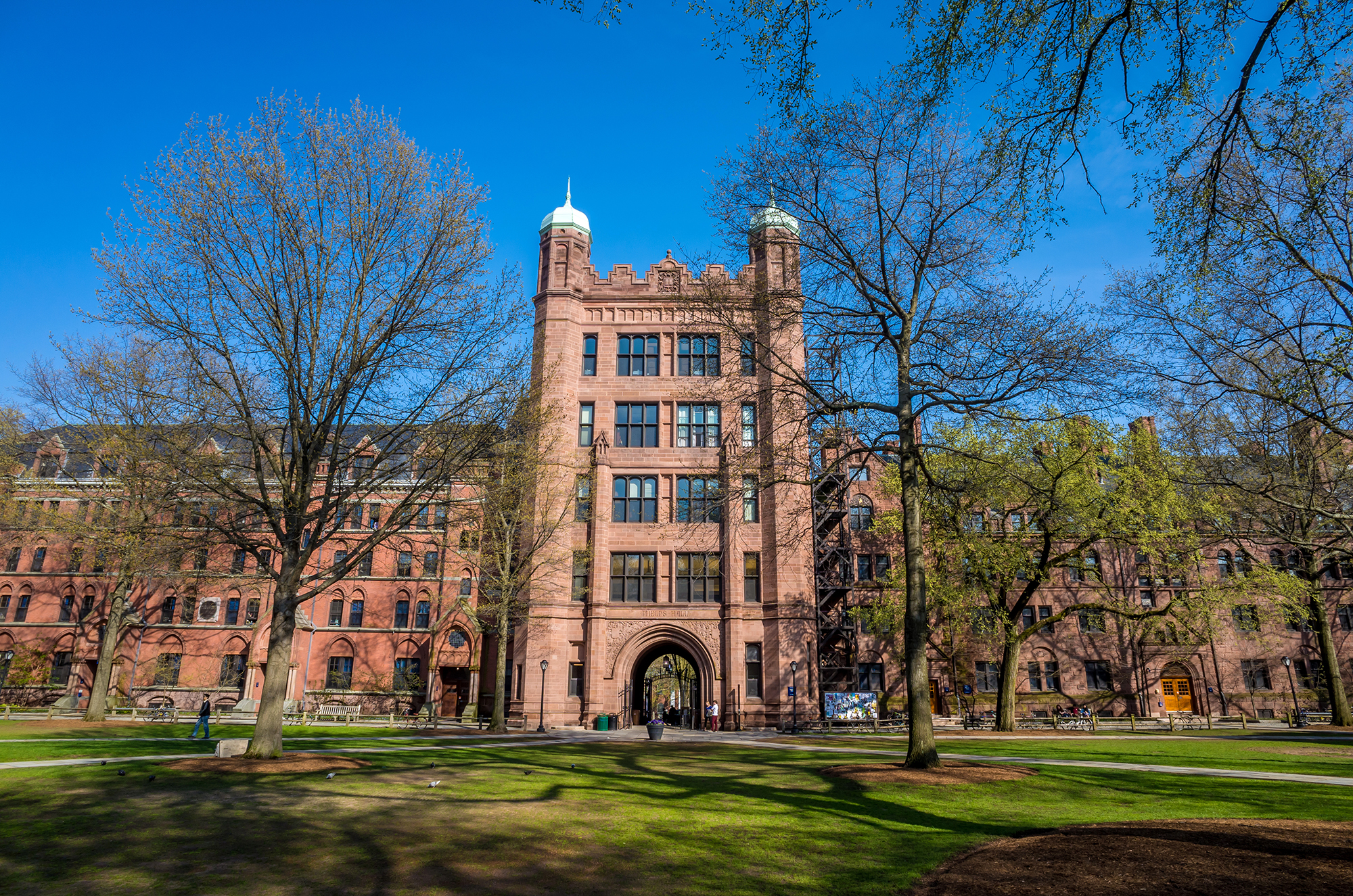
When it comes to living on campus, Yale students are emptying their wallets more, paying an average annual rate of more than $22,000.
However, when it comes to funding, Yale SOM wins. One in every two Yale SOM MBA students earns a merit scholarship. Even better 29 Yale MBA students end up with full-tuition scholarships. On the other hand, only 30 percent of Cornell SC Johnson students receive some scholarship assistance. However, there are many full-tuition scholarships available including 25 Park Leadership Fellowships.
Yale and Cornell School Costs
| Cost | Yale SOM | SC Johnson Cornell |
|---|---|---|
| Tuition | $72,350 | $69,440 |
| Full Cost | $100,274 | $95,340 |
Yale vs. Cornell: Post-Graduation Employment
When it comes to post-graduation, both Yale SOM and Cornell SC Johnson MBA students can expect many opportunities for success. About 94 percent of Cornell MBA students and 91.9 percent of Yale SOM graduates have a full-time job offer three months after graduation.
Those graduates enter a range of industries with the top industries being consulting, finance, and technology. Consulting was the top industry at Yale SOM whereas Cornell students preferred finance. In both cases, most students chose to stay in the Northeast U.S. with 55 percent of Cornell graduates staying in the area and 48 percent of Yale graduates.
Yale vs. Cornell Employment
| Industry | Yale SOM | SC Johnson Cornell |
|---|---|---|
| Consulting | 34.9% | 22% |
| Finance | 23.1% | 29% |
| Tech | 14.9% | 18% |
As for post-graduation salary, both schools are on par with each other. Graduates can expect to earn slightly over $125,000 after graduation with a bonus of around $30,000.
Yale vs. Cornell Salary
| Salary | Yale SOM | SC Johnson Cornell |
|---|---|---|
| MBA Graduate Median Base Salary (2018) | $127,100 | $126,353 |
| Median Signing Bonus | $30,000 | $33,503 |
Inside Yale SOM
Located in New Haven, Connecticut, Yale SOM is one of the top business school’s in the country. Its proximity to New York City means that MBA students have access to many highly coveted networking, partnership, and placement opportunities in one of the business hubs of the world. Its programs are ranked in the top 15 in the world across all international and U.S.-based MBA rankings, regularly placing 11th overall.
Program Offerings
- Full-Time MBA: The two-year, full-time MBA program at Yale SOM requires students to earn 72 credits—39 of which are electives.
- EMBA: The 22-month Executive MBA program at Yale offers classes on alternating weekends (Friday and Saturday) and is ranked first in the world according to The Economist.
There are also multiple joint degree opportunities. MBA students can pursue a joint degree with Yale Law School, Yale School of Medicine, the Yale School of Forestry & Environmental Studies, and the Yale School of Architecture.
Why Yale SOM?
- Yale SOM emphasizes “raw” online cases. These cases attempt to capture the complexity of real decision-making.
- MBA students can participate in 50-plus student clubs on a variety of topics from leadership to social venture.
- Yale MBA students are required to complete an international component, including a 10-day trip to one or more countries. The school is also a part of an exchange program with the London School of Economics, HEC Paris, IESE, National University of Singapore, and Tsinghua University School of Economics.
Inside SC Johnson Cornell
Located in Ithaca, New York, the SC Johnson College of Business at Cornell University is one of the best business schools in the world. It regularly ranks in the top 25 schools globally and the top 15 schools nationally. Its proximity to NYC means that students have many opportunities for networking, internships, and more.
Program Offerings
- Two-Year MBA: The two-year, full-time MBA program at Cornell includes more than 4,000 elective courses from any of Cornell’s top-ranked schools.
- One-Year MBA: The One-Year MBA is designed for students who have already earned a certification or are enrolled in a dual degree program.
- Tech MBA: The Tech MBA program is a 12-month program in the heart of New York City on Roosevelt Island. The curriculum is split into module and studios.
- EMBA NY: The Executive MBA program is 22 months in length and requires students to complete 60 credits every other weekend on Saturday and Sunday.
There are also multiple dual degree programs including a JD/MBA and an MS/MBA. Other dual degree opportunities include a degree in Industrial and Labor Relations, Real Estate, and Health Administration.
Why SC Johnson Cornell?
- Cornell SC Johnson offers eight immersion opportunities. These courses and their projects/cases are based on a specific career path and industry.
- Students have access to more than 120 electives across a range of concentrations. There are also more than 80 professional, regional, and diversity clubs students can join.
- Global learning is not a requirement. However, there are a large number of international business learning opportunities, including international study trips and an international exchange program.
For additional insight, be sure to check out the news at both Yale and Cornell.
NYU Stern and Yale SOM Professors Awarded Nobel Prize in Economics
Faculty define a business school. Their research, teaching, mentorship, and influence have tremendous impact on the experience students have while there and often the careers they pursue once they graduate. From the curriculum they shape to the initiatives and centers they help run, faculty are vital. And it certainly never hurts when those faculty are also Nobel Prize winners.
This year, professors at two leading business schools were recognized with the 2018 Nobel Prize in Economic Sciences: Paul Romer at NYU Stern School of Business and William Nordhaus of Yale School of Management (SOM).
Nobel Prize Winners in Economics
At first glance, Romer and Nordhaus might seem unrelated. Romer has spent his career focusing on the nature of economic growth, seeking to answer the burning question, “Why do economies grow and how?” Nordhaus’ work, on the other hand, dives deep into the economic costs of environmental damage in an effort to gauge how much society would be willing to pay to avert climate change.
And yet both men have been hailed by Sveriges Riksbank, which awards the economics prize, as individuals known for “integrating innovation and climate with economic growth,” The Economist reports. They have also both influenced the way other economists think about critically important and complex systems.
Paul Romer
Paul Romer joined NYU Stern in 2010. Currently on leave, Romer is best known for founding the NYU Stern Urbanization Project in 2011, which conducts applied research on how policymakers in the developing world can use city growth to create economic opportunity and enact social reform.
In economics, Romer is known for developing the “endogenous growth model” and other approaches for spurring the market to generate new ideas. These models are based on the belief that the pace of growth and ways in which ideas are translated into growth depends on factors such as state support for research and development of intellectual-property protections. Hailed as a critical step toward understanding patterns of economic growth across the globe, his models highlight that the creation and spread of ideas is necessary for growth, but not alone adequate for initiating it.
In awarding Romer with the Nobel Price in Economics Sciences, the Swedish Academy cited his influence on “integrating technological innovations into long-run macroeconomic analysis.” (NYU Stern News)
William Nordhaus

Photography ©Mara Lavitt October 8, 2018 Evans Hall, Yale School of Management, 165 Whitney Ave. New Haven Yale University press conference presenting William Nordhaus, the Sterling Professor of Economics at Yale University. Nordhaus was awarded the 2018 Sveriges Riksbank Prize in Economic Sciences in Memory of Alfred Nobel.
Yale SOM Professor William Nordhaus has significantly impacted the teaching of economics at the school. A few years ago, he chaired the Yale Carbon Task Force, which looked at the market price of carbon-related products to determine the need for a market correction due to over-consumption or potential externalities. In particular, the task force delved into questions about distributing costs through organizations, tax effects of corrections, and connectivity problems and solutions.
As a professor, Nordhaus is best known for connecting people with important issues. He asks tough questions that make economics more accessible for everyday people and policymakers.
In economics specifically, he is best known for tackling complex systems surrounding climate change. His research has examined the economic costs of environmental damage and how much society would be willing to pay to avert them. As part of his work, he has combined mathematical descriptions of emissions with integrated assessment models, allowing him to project the impact of different global carbon emissions trajectories on global temperatures.
In awarding him the Nobel Prize in Economics, the Swedish Academy praised his work for “integrating climate change into long-run macroeconomic analysis.” (Yale SOM News)
Changing the Face of Economics
In the end, there’s no denying that both Romer and Nordhaus have blazed new trails in economics and humanity. Their names are synonymous with grappling with global issues we can’t afford not to understand.
This article on Nobel Prize winners has been edited and republished with permissions from Clear Admit.
Yale Full-Time MBA 2020-2021: Application Deadlines, Decision and Notification Dates
Yale Full-Time MBA 2020-2021 Application Deadlines
| Application Round | Application Deadline | Deposit Deadline |
|---|---|---|
| Round 1 | Sept. 15, 2020 | Dec. 8, 2020 |
| Round 2 | Jan. 7, 2020 | Mar. 26, 2021 |
| Round 3 | Apr 13, 2021 | May 18, 2021 |
Highlights of the Yale SOM Full-Time MBA 2021 Class
If you are researching programs and deciding on where to apply, it is important to understand where you stack up against the competition. Below are important metrics for the Cornell Johnson Full-Time MBA.
| Category | Statistics |
|---|---|
| Class Size | 345 students |
| Average Years of Work Experience | 5 years |
| Average GMAT/GRE | 720/330 |
| Average GPA | 3.66 |
| Class Split | 58% male, 42% female, 44% international passport holders |
MBA Checklist for the Yale Full-Time MBA 2020-2021
Refer to this list to be sure your application to the Two-Year MBA program or One-Year MBA program includes the following:
To apply to the Yale School of Management, applicants must have earned a four-year bachelor’s degree from an accredited U.S. institution or the international equivalent. Applicants must submit the online application (including an essay), and the following materials:
- Transcripts from every college or university attended
- Two professional recommendations
- Complete the video questions
- Official GMAT or GRE score (valid within 5 years of exam date)
- Pay the application fee (To make the application process as affordable as possible for candidates with diverse backgrounds, the Yale School of Management uses a sliding-scale application fee structure. The standard application fee is $250. For applicants earning less than $20,000 a year, the application fee is $175. For applicants earning less than $10,000 a year, it is $125. The application fee is based on the self-reported compensation information you provide in the application.)
Additional Resources
- To learn about other applicants applying to the Yale SOM Full-Time MBA, check out the Yale SOM MBA LiveWire via Clear Admit, the leading independent resource for top-tier MBA applicants. MBA LiveWire is a social forum for applicants to share their journey throughout the admissions process.
- The application process can be overwhelming, fortunately you can view FAQ, Essay Topic Analysis, Interview Reports and much more via Clear Admit’s Yale SOM in-depth school profile here.
- To research more information about program cost, financial aid and curriculum, check out the Yale SOM full-time MBA snapshot here.
Yale Faculty Discuss the Global Network for Advanced Management
What happens when leading business schools join forces to increase their resources for students, faculty, staff, alumni and stakeholders? This is what the Global Network for Advanced Management (GNAM) set out to discover in 2012. Continue reading…
Clear Admit Webinar: Admissions Tips from Leading MBA Programs
Join us for a special event devoted to crafting competitive applications for some of the world’s leading MBA programs. You’ll hear from admissions officers at Berkeley Haas, Cornell Johnson, Duke Fuqua, Michigan Ross, NYU Stern, UVA Darden and Yale SOM.
Following the panel, you will also have the opportunity to visit school-specific breakout sessions and connect with admissions representatives to learn about each program’s unique process and get your questions answered.
This MBA Admissions Tips Webinar will have an admissions rep panel followed by breakout Q&A sessions with each individual school.
Dates: November 30th 2023
Time: 7 pm- 9 pm Panel + Breakout Rooms
(all times Eastern)
Join us for this special free event featuring seven of the top MBA programs in the world. Register below for access to this MBA Admissions Tips Webinar.
Clear Admit – MBA Essay Insight Webinar Series Fall 2022
We’re sure you’ve already heard that the application essays are a crucial component of the MBA application. So how can you gather some MBA Essay help without the use of sample essays?
Get essay tips straight from admissions representatives at leading business schools during our upcoming MBA Essay Insight Webinar Series!
Dates: September 14, September 21, September 28.
Time: 12 pm-1 pm Panel & 1 pm-1:30 pm Breakout Q&A with Individual Schools
(all times Eastern)
Each session will start with a 60-minute roundtable panel, hosted by Clear Admit Co-Founder Graham Richmond. Admissions reps will share some insight into their programs and offer detailed advice on how to tackle their school’s essays.
We’ll cover:
- How do the admissions teams develop their essay prompts?
- What are the characteristics of an effective essay?
- What should applicants keep in mind as they approach each essay?
- How do the essays fit into the review of the larger MBA application?
Following the panel, each school will host a breakout session to chat with prospective applicants and answer their individual questions.
Here are the schools you can expect to see at each of the three essay events:
September 14:
Berkeley Haas
Chicago Booth
Cornell Johnson
Penn Wharton
Yale SOM
September 21:
Carnegie Mellon Tepper
Columbia Business School
Duke Fuqua
UNC Kenan-Flagler
Texas McCombs
September 28:
Dartmouth Tuck
Georgetown McDonough
INSEAD
London Business School
Break out your favorite pen, put your thinking caps on, and get ready to work on those writing skills. You can eliminate your need for a sample essay and craft your own story!
Register for the MBA Essay Help Webinar Series via the button below! You can sign up for any number of events or the entire series! Even if you cannot make it, register below and we will provide you access to the recording. We hope to see you there!
Clear Admit MBA Essay Insight Webinar Series Summer 2022
We’re sure you’ve already heard that the application essays are a crucial component of the MBA application. So how can you ace this part of the admissions process without the use of sample essays?
Get essay tips straight from admissions representatives at leading business schools during our upcoming MBA Essay Insight Webinar Series!
Dates: July 13, July 20, July 27 & August 3.
Time: 12 pm-1 pm Panel & 1 pm-1:30 pm Breakout Q&A with Individual Schools
(all times Eastern)
Each session will start with a 60-minute roundtable panel, hosted by Clear Admit Co-Founder Graham Richmond. admissions reps will share some insight into their programs and offer detailed advice on how to tackle their school’s essays.
We’ll cover:
- How do the admissions teams develop their essay prompts?
- What are the characteristics of an effective essay?
- What should applicants keep in mind as they approach each essay?
- How do the essays fit into the review of the larger MBA application?
Following the panel, each school will host a breakout session to chat with prospective applicants and answer their individual questions.
Here are the schools you can expect to see at each of the four essay events:
July 13th
Berkeley Haas
Chicago Booth
Dartmouth Tuck
UVA Darden
July 20th
Carnegie Mellon Tepper
Duke Fuqua
INSEAD
London Business School
Texas McCombs
July 27th
Columbia Business School
MIT Sloan
NYU Stern
Penn Wharton
Stanford GSB
August 3rd
Cornell Johnson
Michigan Ross
UCLA Anderson
UNC Kenan-Flagler
Yale SOM
Break out your favorite pen, put your thinking caps on, and get ready to work on those writing skills. You can eliminate your need for a sample essay and craft your own story!
Register for the MBA Essay Insight Webinar Series via the button below! You can sign up for any number of events or the entire series! Even if you cannot make it, register below and we will provide you access to the recording. We hope to see you there!
U.S. News 2023 Full-Time MBA Ranking: Wharton & Chicago Booth Share Top Spot
The 2023 U.S. News Best Graduate Programs Rankings rolled out today and we’re taking a closer look at the full-time MBA program list. Chicago Booth and The Wharton School share the top spot, surpassing last year’s #1, Stanford GSB, which now ranks third along with Northwestern Kellogg.
On Wharton and Booth landing in the top slot, Clear Admit Co-founder Graham Richmond notes, “This is likely due to these programs’ impressive statistics on both sides of the equation: incoming stats (GPA, GMAT, acceptance rate) and outgoing stats (percentage of the class employed, salaries, etc.).”
Harvard Business School and MIT Sloan held steady compared to last year, maintaining their fifth positions. Richmond continues, “Yale impressively lands at #7, leapfrogging both Berkeley Haas and Columbia. Yale SOM just continues to cement their presence in the top-10 and now seem to be pushing past some programs they have historically trailed. Michigan Ross jumps three slots to grab a top-10 position, which is great news for a program that prides itself on experiential learning and has terrific placements across the whole of the United States.”
The top 25 schools in this year’s U.S. News MBA Ranking (with last year’s rankings included for reference) are as follows:
| School | 2023 Rank | 2022 Rank |
|---|---|---|
| University of Chicago (Booth) | 1 (tie) | 3 |
| University of Pennsylvania (Wharton) | 1 (tie) | 2 |
| Stanford University | 3 (tie) | 1 |
| Northwestern University (Kellogg) | 3 (tie) | 4 |
| Harvard University | 5 (tie) | 5 (tie) |
| Massachusetts Institute of Technology (Sloan) | 5 (tie) | 5 (tie) |
| Yale University | 7 | 9 |
| Columbia University | 8 (tie) | 7 (tie) |
| University of California–Berkeley (Haas) | 8 (tie) | 7 (tie) |
| University of Michigan–Ann Arbor (Ross) | 10 | 13 (tie) |
| Dartmouth College (Tuck) | 11 | 10 (tie) |
| New York University (Stern) | 12 (tie) | 10 (tie) |
| Duke University (Fuqua) | 12 (tie) | 12 |
| University of Virginia (Darden) | 14 | 13 (tie) |
| Cornell University (Johnson) | 15 | 15 |
| Carnegie Mellon University (Tepper) | 16 | 16 (tie) |
| University of California–Los Angeles (Anderson) | 17 | 18 (tie) |
| University of Texas–Austin (McCombs) | 18 | 18 (tie) |
| University of North Carolina (Kenan-Flagler) | 19 (tie) | 20 |
| University of Southern California (Marshall) | 19 (tie) | 16 (tie) |
| Emory University (Goizueta) | 21 | 26 (tie) |
| Georgetown University (McDonough) | 22 (tie) | 21 |
| University of Washington (Foster) | 22 (tie) | 22 |
| Indiana University (Kelley) | 22 (tie) | 23 (tie) |
| Vanderbilt University (Owen) | 25 (tie) | 23 (tie) |
| University of Notre Dame (Mendoza) | 25 (tie) | 36 (tie) |
Looking past the top 10, USC Marshall fell three slots from 16 to 19, reversing a trend where the program had been creeping up and battling UCLA Anderson for Los Angeles’s presence in the top 16. Richmond adds, “Emory Goizueta jumps up 5 slots to #21, which is likely a reflection on the plethora of employment opportunities in the Atlanta metro and U.S. Southeast, and the school’s continued push towards the top 20. Notre Dame’s Mendoza College of Business made the biggest gains among top-25 programs, catapulting 11 slots up into the #25 position from last year’s #36.”
In conclusion, Richmond says, “It is worth noting that Stanford GSB’s numbers stayed very similar to last year – and were, in fact, even improved in some areas! This makes the overall results a bit of a head scratcher. In the end, it seems that both Stanford and HBS are paying the price for having slightly lower employment numbers, which is mostly tied to their success at encouraging entrepreneurial ventures among students.”
Methodology
To determine their annual rankings, U.S. News uses a combination of expert opinions about program excellence and statistical indicators that measure the quality of faculty, research, and students. Forty percent of the evaluation is based on a quality assessment score, comprised of a peer assessment where deans and program directors rank their peers and a recruiter assessment score. Thirty-five percent is based on placement success demonstrated by employment rates at graduation and within three months of graduation, and mean starting salary and bonuses. Twenty-five percent is based on student selectivity, as seen in GMAT and GRE scores, mean undergraduate GPA, and acceptance rate.
Clear Admit Event Series: Deferred Enrollment MBA Application Insight, Join us February 2nd and 9th
Looking for a Deferred Enrollment MBA Event and set on one of these programs? Join us to hear how to amp up your application for these special pathways to b-school.
Full-time MBA programs traditionally require several years of full-time work experience, but deferred enrollment MBA programs allow candidates to apply – and secure a seat in a future class – during their senior years of college or final years of masters study. How can you demonstrate your fit for this kind of program? How should you approach the admissions process? Hear directly from leading programs in this two-part series in February 2022.
In each 60-minute panel deferred enrollment MBA event, we will speak with representatives from leading MBA programs to learn about their deferred enrollment opportunities. The panel presentation will be followed by a 20-30 minute Q&A breakout room with each participating school. During the panel, we will cover:
- Program structures and admissions requirements
- An overview of the application process
- Characteristics of strong deferred enrollment applicants
- Application advice direct from the schools
See below for which MBA programs will be represented in each session:
Wednesday, February 2nd, 2022, 12 p.m. EST
- UC Berkeley Haas Accelerated Access
- Carnegie Mellon Tepper Future Business Leaders
- Chicago Booth Scholars Program
- Columbia Business School Deferred Enrollment Program
Wednesday, February 9th, 2022, 12 p.m. EST
- MIT Sloan MBA Early Admission
- UVA Darden Future Year Scholars Program
- Wharton School Moelis Advance Access Program
- Yale SOM Silver Scholars
We hope to see you there! Register here.
The Impact of COVID-19 on MBA Admissions
Due to the COVID-19 pandemic, MBA applicants are facing a unique admissions season for 2020-2021. A ‘typical’ admission season would provide numerous opportunities to meet with school representatives in person. Campus tour guides would be warm and welcoming, showing off brand new campus improvements and escorting applicants to classrooms for lively discussions. Even the GRE or GMAT would be better—marking answers in the controlled environments of test-taking centers. However, the impact of COVID-19 on MBA admissions is impacting everything.
However, this year’s admissions season will look much different. As an applicant, it is important to keep this in mind and adapt to the new circumstances—a skill that will be transferrable to your post-MBA life as well. On a positive note, according to metromba.com co-founder, Eliot Ingram, “COVID19 led to some big adjustments for both business schools and applicants this past spring and summer. The good news is that applicants who apply this fall won’t start school until the fall of 2021 and schools are likely to have made great strides in restoring the traditional in person experience by then.”
To help you prepare for this unique admissions season, MetroMBA has compiled common trends among business schools, how schools are handling the impact of COVID-19 on their admissions process, and a few tips on adapting to this new experience for both schools and applicants.
Common Changes Programs are Making Due to COVID-19’s Impact on MBA Admissions


2019-2020 Deferrals and 2020-2021 Deadlines
COVID-19’s impact on admissions began earlier this year, as many schools extended their Round 3 (or later) deadlines through the late spring and early summer. Many programs held out hope that in-person, on-campus classes could resume by the fall of 2020, but the pandemic continues to keep campuses closed. For new b-school admits to the Class of 2022, the prospect of first-year classes being held virtually was not ideal. In response to this complication, many business schools offered candidates the option to defer for a year. Although data is not yet available on how this will impact future acceptance rates, keep in mind that a percentage of each school’s Class of 2023 will be deferred students.
As you enter this year’s admissions cycle, it is important to keep in mind that many schools have kept their deadlines consistent from previous years. Clear Admit, the leading independent resource for top-tier MBA applicants, has in-depth information on what round it is best to apply to business school.
Delayed Submission for GMAT/GRE and More Test Options Available
Two major changes to this year’s admissions season are the ability to submit your GMAT or GRE score later than a typical deadline. Schools have also expanded the entrance exams they accept, such as the Executive Assessment (EA), LSAT or MCAT, for admission.
So, what does that mean for an applicant?
Well, first off, it is important to prepare for the GMAT or GRE as early as possible to give yourself the best chance to score high. Your test score is only one component of the overall admissions process; however, it is a very important metric as admissions teams review your full application. The second thing to consider is what test format allows you to be the most successful. The decision to allow exams used by med school and law school applicants was made due to the continued difficulty of taking the GRE or GMAT in a test center, many of which remain closed.
At-home Version of GRE, GMAT and EA More Widely Accepted
The Educational Testing Service (ETS), which owns the GRE, and Graduate Management Admissions Council (GMAC), which owns the GMAT and EA, have adapted to the COVID-19 crisis by offering applicants an at-home version of their respective tests. For example, GMAC has decided to make its at-home online version of the GMAT exam available through the end of 2020. It’s the third time that GMAC has extended the deadline for what was initially billed as a temporary interim solution when it was launched back on April 20th when most test centers closed due to the pandemic.
Virtual Events Have Become the Norm
Even if you think you’ve been on too many Zoom meetings or watched too many virtual information sessions, get ready—it’s going to be the new norm for this year’s admissions season. The majority of schools have moved all of their events to virtual formats, including recruiting events, interviews and campus visits. We encourage applicants to attend as many virtual events as possible as they prepare their application. There are many resources available, including the Clear Admit Applicant Insight Workshop Series, which provides applicants specific information on a school’s essay topic and provides in-depth information on the student experience. The event series includes participation from the Wharton School of Business, Yale SOM, Fuqua School of Business, MIT and more. The first two events will be held on September 2nd at 12:00 EST and September 16th at 12:00 EST.
From the schools…


“At Santa Clara’s Leavey School of Business, we have pivoted quickly to online offerings. All of our events are now online and we are seeing more students attend these engaging sessions over Zoom. Prospective students are also able to connect with a current student online as well. Overall, we have seen a strong demand in most of our programs this fall and applications are up by 50%! My advice to students is to apply early and connect with the admission offices of the schools you are applying to sooner, as I believe there will be more competition for many programs in the fall of 2021.”


“At Syracuse University’s Whitman School of Management, we actually saw a major increase in MBA applicants. I think there are two main reasons for that. First, we have robust plans in place in a time of COVID-19 for additional support for students who are on campus and those who elect to follow along remotely. We were quick to communicate that support and ensure that our students continue to be safe and healthy. Our faculty have a lot of experience in online teaching and so we were able to smoothly adjust and maintain high quality instruction, regardless of modality. Second, students increasingly saw the value of a Whitman education. We inspire students for a world of accelerating change, and our curriculum and programming support just that. Our alumni and corporate partners really helped with this, too. We’re on the right track and students recognized that.”
Quick View: 5 Tips for Preparing for MBA Admissions Impacted by COVID-19
- Research deadlines and when to apply
- Prepare for virtual interviews and recruiting events
- Review test options accepted at each school
- Stay connected with top school via recruiting events and information sessions
- Relax, breathe and enjoy the journey!
Join Clear Admit’s Applicant Workshop Series
Our sister site – Clear Admit – is giving you behind-the-scenes access to the top MBA programs you desire – specifically regarding tips on the admissions process – with some key advice directly from their admissions teams. The Clear Admit Applicant Workshop will be all about Essays!
This workshop will be offered on two different dates with multiple programs being represented at each event (so be sure to register for both!). Both events will be hosted by Graham Richmond from the Clear Admit team and each hour-long webinar will begin at 12 p.m. EDT.
The representatives from each school represented will start with a roundtable discussion on the following topics:
1) Showcasing key elements of their full-time MBA program
2) Providing insight into the essay portion of their applications.
Following this 45-minute roundtable discussion, each school will host a private breakout session where applicants can connect directly with admissions representatives.
See which schools will be in attendance, and be sure to register today to the Clear Admit Applicant Workshop.
| Schools Represented | Date |
|---|---|
| Columbia, Duke Fuqua, UPenn Wharton, Yale SOM | September 2, 2020 |
| Chicago Booth, MIT Sloan | September 16, 2020 |
You may recognize our host, Graham Richmond, from our weekly Wire Taps podcast episodes, and he is looking forward to connecting our audience with top schools through these workshops.
Richmond, a co-founder of Clear Admit and Wharton MBA, also co-founded the Association of International Graduate Admissions Consultants (AIGAC) in 2006 and served as the organization’s President for several years. In addition to supporting MBA applicants through the admissions process for decades, he’s also presented advice and research to business school admissions stakeholders at the annual conference of the Graduate Management Admissions Council.
Coronavirus Concerns Disrupt MBA Admissions Interviews, Testing and More
As the number of confirmed coronavirus cases reaches over 80,000 globally, mounting concerns have disrupted normal operations of MBA admissions testing, interviews and events.
Entrance Exam Sessions Suspended
GMAT, GRE, IELTS, and TOEFL testing in mainland China has been pushed back further to the end of March. On its official website, the Graduate Management Admissions Council, which owns and administers the GMAT and Executive Assessment, states the following:
“In the interest of the health and safety of our candidates, all testing in Mainland China has been suspended through March 31, 2020. Previously scheduled GMAT and Executive Assessment test appointments at test centers in Mainland China through March 31, 2020 are being canceled and full refunds provided to candidates who had appointments scheduled during this time. No new appointments are being accepted through the end of March.
Appointments for the GMAT exam and the Executive Assessment can be made at test centers in Mainland China for dates as of April 1, 2020 and beyond. Test centers in the Special Administrative Regions of Hong Kong and Taiwan are open and accepting test appointments for test dates as of February 3. We are working closely with our testing partner to expand testing availability.”
In addition, GMAT testing in Northern Italy, which has nearly 500 confirmed cases of the virus, has also been postponed until early March. The virus has also caused delays in the QS World Grad School Tour, which originally featured stops in Torino, Milan, Bologna, Rome, and Naples in mid-March, until May 2020.
GRE testing will also be temporarily delayed in Iran, Italy, South Korea, and Vietnam. Testing has officially resumed, however, in Hong Kong.
MBA Admissions Interviews Move Online
Business schools are also making adjustments to their admissions practices in response to health risks and travel restrictions stemming from the coronavirus threat. Instead of conducting admissions interviews in-person in China, Duke Fuqua will be holding them via Skype, according to Associate Dean of Admissions Shari Hubert. For those invited to interview at Wharton, but affected by travel restrictions, Director of Admissions Blair Mannix noted that the school is offering virtual Team-Based Discussion interviews.
The Switzerland-based school, IMD, also cancelled admissions interviews in Singapore, and expects to host online interviews and case studies for candidates affected by travel restrictions. ESMT in Berlin conducts most of their interviews online anyway, but Head of Marketing Rick Doyle reported that they have altered some travel in the coming months and will be relying on local alumni to engage candidates face-to-face. For applicants affected by the availability of the GMAT and TOEFL, ESMT is trying to be flexible.
On the applicant side, a Yale SOM interviewee and a Georgetown McDonough candidate reported on LiveWire that their admissions interviews were changed from in-person to online.
MBA applicants report on LiveWire how their admissions processes have been impacted by the coronavirus.
Per the image, anon20605 stated: “I had an interview with MSB (Georgetown) off campus (Mumbai) on 7 Feb. They postponed it and changed it to a virtual interview because the team preferred not to travel due to the outbreak.”
Community member anon42375 wrote: “Yale interview with admissions in Tokyo was cancelled on Wednesday, and I had to reschedule for an online interview via Zoom.”
Safety Measures Mean On-campus Interactions Go Virtual, Too
Business schools in China have been closely monitoring the outbreak, with on-campus life at schools undergoing changes. On February 21st, the China Europe International Business School (CEIBS) held its first “virtual town hall,” sharing admissions and other updates to the school’s MBA calendar.
The town hall was hosted by CEIBS Vice President and Dean Yuan Ding, who said,
“Although we have seen encouraging signs of improvement recently, we must balance this optimism with caution when it comes to the safety of the CEIBS community. As such, we have introduced a series of measures to adjust our schedules for term dates, overseas lectures, INNOVATEChina and MBA graduation, so as to avoid large scale gatherings until the coronavirus is brought completely under control.”
CEIBS Associate Dean and MBA Director Juan Antonio Fernandez added, “Despite the geographic distances involved, the MBA Office will strive to remain close to you all, now more so than ever as we temporarily move lectures from the classroom to the cloud for term three.”
As members of a global community, business schools are taking every precaution in light of the coronavirus. Stay tuned for ongoing coronavirus updates.
This article has been edited and republished with permissions from its original source, Clear Admit.
The Top Deferred Enrollment MBA Programs
In the past several years, we’ve seen more and more leading business schools offering deferred enrollment MBA programs.
Traditionally, full-time work experience has been a requirement for acceptance into a leading MBA program, with students averaging five years of professional experience at the time they begin their graduate studies.
Most deferred enrollment programs still require work experience—the difference is that students can gain this experience after they earn admission. Deferred enrollment MBA programs guarantee college seniors (and sometimes graduate students) a spot in their MBA programs, allowing them to enroll two to five years after they graduate from college. This allows students to focus on their work experience with their MBA plans already in place.
Read on for information about deferred enrollment programs at:
- Berkeley Haas
- Chicago Booth
- Columbia Business School
- Harvard Business School
- MIT Sloan
- Northwestern Kellogg
- Stanford GSB
- UVA Darden
- The Wharton School
- Yale School of Management
How Deferred Enrollment Programs Work
“This type of program is for those who know that an MBA program is something they want to pursue in the future. Not directly after their undergraduate degree (in most cases), but a couple of years later,” explains Alex Brown, an MBA admissions expert at Clear Admit.
Ambitious undergraduate students apply to b-school during their senior years and then receive a promise of a seat in a future cohort. Typically, they are required to gain two to five years of full-time work experience between being accepted and starting an MBA. Once they do enroll, they join the same MBA cohort as those admitted through the traditional application process.
“Applying and gaining admission during college helps reduce the uncertainty of their plan going forward. So rather than entering an analyst program at a consulting firm, for example, with the hope of gaining admission to a top MBA program after a few years, new graduates can enter the program knowing they have an MBA option already,” says Alex. “Of course, it doesn’t stop them from changing their minds, or pursuing other MBA options and forgoing the early admission.”
These deferred enrollment programs are ideal for candidates with established leadership skills. Typically, candidates have outstanding internships, strong academic credentials, and high test scores when they apply. “Also, these candidates are still typically early in their career arch when they start their MBA programs. But, it makes sense if they are focused and really understand how the MBA program will help develop their career further,” explains Alex. “It’s good for candidates with focused career goals.”
Additionally, it’s worth noting that deferred admissions MBA programs are open to applications from students of all academic backgrounds. In addition to the finance, business, and economics majors, who are well represented in the traditional MBA applicant pool, deferred enrollment programs welcome those from a STEM or humanities backgrounds. Whatever their major, the key for applicants is to have a solid plan for the future and a good sense of how an MBA fits into that plan.


Deferred Enrollment Programs at a Glance
So, what are some of the top deferred enrollment programs and how do they vary?
At a glance, the structure of most deferred enrollment MBA programs are similar. All but Yale SOM are two years in length and place students in the same cohort as the full-time MBA. On the other hand, the Yale Silver Scholars program is three years in length, with the first and third year being the same as the standard MBA and the second year being an extended internship. The reason behind this difference is that the program accepts candidates directly after their undergraduate career without any work experience.
The rest of the programs require that students gain two to five years of full-time work experience before they start their MBA studies. However, in some cases, work experience is not required if the student is currently completing another graduate degree (this is the case for Stanford’s program).
“Generally, the students co-exist in the same program” as those admitted through the traditional process, explains Alex. “Younger students might have more energy and enthusiasm, older candidates might have more experience and insights. It can become a great blend for an academic experience.”
Another key distinction is eligibility; the Haas Accelerated Access and Wharton Moelis programs are only open to UC Berkeley and University of Pennsylvania students, respectively. In 2019, Wharton added another deferred admissions program for students from any institution, not just Penn. MIT Sloan allows MIT students with an undergraduate GPA of 4.25 to waive the GMAT, and UVA Darden, Haas, and Wharton all offer scholarships for their deferred programs.
Deadlines for each of these programs tend to fall April, around the Round 3 MBA application deadlines.
Inside the Deferred Enrollment MBA Programs at Leading Business Schools
Here’s a deeper look at the details of each school’s deferred enrollment MBA structure, eligibility, and application requirements.
Berkeley Haas Accelerated Access
The Berkeley Haas Accelerated Access program is currently only open to UC Berkeley undergraduate and graduate students in their final year of study—though there are plans to expand to the rest of the University of California and beyond in the future. The program offers early conditional admission into the Full-Time MBA program with the ability to defer for two to five years to gain professional experience. There are two application deadlines—one in April and one in June—with an application process very similar to the full-time MBA program, except the application fee is waived.
Application requirements include the application form, university transcripts, two short essays, two recommendations, a resume, and the GMAT or GRE. Interviews are then conducted by invitation only. Accepted candidates must make a $500 deposit.
To celebrate the launch of Accelerated Access, up to five $100,000 scholarship awards will be available for students applying in 2020. Upon matriculation, candidates will be eligible for other scholarships and dual degree programs.
Chicago Booth Scholars Program
The Chicago Booth Scholars program is a deferred MBA program for promising candidates looking to secure a seat in a future Chicago Booth full-time MBA cohort. It’s open to undergraduates from any institution in their senior year, and grants admits a two to four-year deferment before they begin the full-time MBA program. While working full time, students have the opportunity to engage with Booth and explore the University of Chicago community. If candidates prefer to continue working after four years, they have the opportunity to enroll in the Evening or Weekend MBA programs.
Applications are due in April, and are similar to the full-time MBA application. Application requirements include a data form, short answers, an essay, two recommendations, unofficial transcripts (official copies required of admitted students), and professional resume. International students must take the TOEFL, unless their undergraduate degrees were conducted in English. All applicants must take the GMAT or GRE; there is no preference given to either test. Interviews are then conducted on an invitation only basis.
Columbia Business School Deferred Enrollment Program
The Columbia Business School Deferred Enrollment program is open to undergraduate and Master’s students who apply during their final years of study. (Students enrolled in Ph.D. programs, law school, or medical school are not eligible.) Once accepted, they can take two to five years to enter the workforce, and start the full-time MBA program when it’s right for them. To begin the program, candidates simply send the school a letter of intent to Columbia indicating whether they want to enroll in January (16-month program) or August (20-month program with summer internship). Admitted students gain access to conferences, events, and school-wide resources prior to matriculating.
Applications are due by mid-April, and requirements include a data form, short answer questions, an essay, two recommendations, academic transcripts, and professional resume. All applicants must take the GMAT, Executive Assessment, or GRE within three weeks of applying. Interviews are then conducted on an invitation only basis. CBS releases decisions on a rolling basis, within two weeks of the interview.
In 2019, 114 candidate were admitted to the CBS Deferred Enrollment Program. Their GMAT scores ranged from 640-790, and GPAs ranged from 2.92-4.0. Forty-nine schools and 11 countries were represented in this incoming class.
Harvard Business School 2+2 Program
Harvard’s 2+2 program is perhaps the best-known deferred MBA. Candidates apply in their final year of undergraduate or graduate school, then spend a minimum of two years (maximum of four) working full-time before they begin Harvard’s full-time, two-year MBA program. This program is open to students who plan to work in the public, private, or nonprofit sector, with preference given to applicants planning to work in an operating company (tech, manufacturing, consumer goods, retail, industrials, etc.), from a lower socio-economic background, going into a technically demanding role, or pursuing entrepreneurship. Students enrolled in Ph.D. programs, law school, or medical school are not eligible; they should apply through the regular MBA admissions process.
The application is essentially the same as for the traditional MBA program, though the application fee is $100 instead of $250. The application fee is waived for active duty military applicants. The admissions deadline is in April. Candidates may enter the full-time MBA program once they have met work experience requirements.
More than 1,400 candidates applied to be a part of the Class of 2023, and 115 students ultimately committed to the program. Their GMAT scores ranged from 590-790, and their average GPA was 3.79.
Kellogg Future Leaders
Northwestern Kellogg’s Future Leaders program is open to any undergraduate student in their final year of school, as well as Master’s students who began their graduate programs directly after undergrad. Students enrolled in Ph.D. programs, law school, or medical school are not eligible; they should apply through the regular MBA admissions process.
Successful applicants defer their enrollment at Kellogg for two to five years, during which time they are expected to gain relevant work experience. Candidates may also reassess which MBA program to join; while applicants are accepted into the full-time two-year MBA program, they can also choose the Evening & Weekend or One-Year program. They may also expand their plans to consider the JD-MBA or MMM, though those require admission to the other Northwestern schools.
The application requires brief essays, a recommendation, and an interview by invitation; the TOEFL and GMAT/GRE are also conditional requirements. Non-native English speakers must take the TOEFL, unless their undergraduate studies were conducted in English. Northwestern undergraduates do not have to take the GMAT/GRE, but it is required for all other students. While there is no application fee, admitted candidates need to make an initial deposit of $500, then $500 for every year of deferment; these funds ultimately apply to tuition when they matriculate.
MIT Sloan MBA Early Admission
The MIT Sloan MBA Early Admission program is open to any exceptional undergraduate student during the year that they are graduating. Graduate students without full-time work experience may also apply. Between being accepted and starting the program, candidates are expected to seek two to five years of full-time work experience.
Applications are due in April, and requirements include a data form, cover letter, video statement, two recommendations, academic transcripts, and professional resume. All applicants must take the GMAT or GRE, but MIT students can waive the GMAT or GRE if they have a GPA above 4.2. Interviews are then conducted on an invitation-only basis. The application fee is waived for all candidates.
Stanford GSB Deferred Enrollment
The Stanford GSB Deferred Enrollment program is open to undergraduate students who want to begin their MBAs immediately after their senior year. However, students are encouraged to defer for one to three years to gain work experience (two-year deferrals are most common). They can apply during any of GSB’s three application rounds, and can choose which year’s MBA cohort they would like to enter. If they decide to defer for one to two years, they can apply for specific fellowships the year before starting their full-time MBA.
Those eligible for deferred enrollment have their application fee reduced to $100.
UVA Darden Future Year Scholars Program (FYSP)
The UVA Darden FYSP program is open to undergraduate students in their final year, as well as Master’s students. Candidates can apply in January, April, or August. Once admitted, they then go on to gain two to four years of work experience while also gaining access to the Darden alumni community for mentorship, networking, and individualized career support. Then, once ready, candidates join the regular full-time MBA program.
The application requires a GMAT, GRE, MCAT or LSAT score, but applicants are encouraged to take the GRE or GMAT before matriculating. Applicants must also submit a resume, transcripts, an essay, and two letters of recommendation. While there is no application fee, admitted candidates need to make a deposit of $500 for every year of deferment; these funds ultimately apply to tuition when they matriculate.
Wharton Advance Access Program
Undergraduate seniors and graduate students from any institution outside of Penn can apply early for the Wharton MBA through the Advance Access Program. Accepted applicants receive special professional development and career services support, as well as access to the Wharton community including annual retreats and mentoring. Applicants may apply in their senior year during Round Three of the MBA admission timeline, and are evaluated similarly to the overall MBA applicant pool. Candidates defer for two to four years of work experience, and then join the regular two-year, full-time MBA program when they’re ready.
University of Pennsylvania undergraduates, specifically, can apply through the Wharton Moelis program. The benefits mirror those of the Advance Access program, with the added potential for a $10,000 yearly fellowship (or more, based on merit).
While the application fee for the Moelis program is waived, applicants through the Advance Access program must pay a reduced application fee of $100. The application requirements for both options include unofficial transcripts, GMAT or GRE score, a resume, two letters of recommendation, two essays that are the same as the general MBA application, and interviews (Team-Based Discussion & one-on-one). Admitted candidates through either program need to make a deposit of $1,000 at the beginning of June of the year they are accepted, and then another deposit of $1,000 when they decide to matriculate. The school also expects yearly affirmation of intent to attend the program, as well as verification of work experience.
Yale SOM Silver Scholars
Students admitted to the Yale Silver Scholars program start their MBA studies immediately after college graduation. Candidates spend one year completing the core curriculum, and then undertake an extended full-time internship in year two. Then, during the third year, they return to Yale SOM to complete their degree with MBA elective courses. Students are fully integrated into the Yale SOM MBA class, but they have special programming and career development support that’s tailored to them. Candidates apply during their senior years of college.
Applicants complete the same online application as regular enrollment candidates, with nuances in the Work Experience and Activities sections of data form. Yale notes that only college seniors are eligible to apply, and they must submit two letters of recommendation. If invited to interview, candidates will meet with one or more members of the Silver Scholars committee.
This article has been edited and republished from its original source, Clear Admit.
News Roundup – Georgia Tech Gender Parity Achievement, and More
Let’s take a look at some of the biggest stories from this week, including Georgia Tech gender parity achievements at the Scheller College of Business.
Georgia Tech Scheller College’s Executive MBA Celebrates Gender Parity Student Enrollment – Scheller College of Business News & Events
The Georgia Tech Scheller College of Business recently announced that its Executive MBA (EMBA) program is now the first nationally-ranked business schools to achieve full gender parity.
Associate Dean of MBA Programs, Brian Jennings, says:
“Our ongoing strategic focus on diversity and inclusion is making a true difference. We whole-heartedly believe a diversified cohort enhances the MBA experience for all, as each student enriches the classroom with their unique experiences, expertise, insights, and participation … This is a proud moment for all of us here at Georgia Tech Scheller College of Business.”
“Our ongoing strategic focus on diversity and inclusion is making a true difference. We whole-heartedly believe a diversified cohort enhances the MBA experience for all, as each student enriches the classroom with their unique experiences, expertise, insights, and participation … This is a proud moment for all of us here at Georgia Tech Scheller College of Business.”
While the majority of leading MBA and EMBA programs strive for gender parity, it is still long in the future for many. Wharton and Tuck School of Business have both enrolled 44 percent female students in the Class of 2019 MBA class, and Yale SOM and Michigan Ross have enrolled 43 percent. USC Marshall has previously reported gender parity in its MBA classes.
For more on Scheller’s Class of 2019, read here.
Assistant Professor David Drake Receives the 2018 Page Prize for Excellence in Business Sustainability Education – University of Colorado Leeds School of Business
David Drake, Leeds School of Business’ Assistant Professor of Strategy, Entrepreneurship and Operations recently won the Page Prize for Excellence in Business Sustainability Education.
Drake was joined by his colleagues Andre Calmon and Jackie Stenson of INSEAD in teaching the award winning course, “Building a Sustainable Future: Business Model Innovation as a Force for Good.”
The course trains MBAs in using a curriculum based strongly in a framework of the UN’s Sustainability Guidelines. Three main outcomes are presented as goals in the course: problem framing and design thinking; value chain management; and risk and cost analysis and management. For more on Drake, his colleagues, and the course, read here.
Rutgers Master’s in Governmental Accounting Ranked No. 2 Online Accounting Master’s in the U.S. – Rutgers Business School News
Educational ranking website College Consensus recently surveyed 600 schools across the country focusing on affordability, convenience and reputation, and ranked Rutgers Business School second overall for its online accounting master’s program.
Irfan Bora, Assistant Professor of Professional Practice and Director of the Master’s in Governmental Accounting, says of the placement:
“College Consensus examined three important factors that students consider beyond academic rigor, accreditation and career advancement, in which the Rutgers Business School Master’s in Governmental Accounting has excelled for 25 years … The first and only internationally recognized, interdisciplinary, fully online Master’s in Governmental Accounting is tailored for the working professional to earn an advanced accounting degree anywhere, anytime.”
For the full rankings, read here.
Peter Rossi Receives 2019 ISMS Fellow Award – UCLA Anderson News
The INFORMS Society for Marketing Science (ISMS) has honored UCLA Anderson’s Peter E. Rossi, Distinguished Professor of Marketing, Economics and Statistics, its 2019 Fellow Award. He is joined by J. Miguel Villas-Boss of Berkeley Haas in receiving the award.
Rossi says, “I regard it as an affirmation of what I’ve tried to do my whole career—to influence other marketing researchers, both in academia and in industry … My goal my entire life as an academic has been to have an impact on things that matter in marketing and also on the practice of marketing.”


Rossi’s specialties are targeting marketing and hierarchical choice models. The book that he co-authored, Bayesian Statistics and Marketing, is an important tool for marketing researchers in applying advanced data analysis and studies of consumer behavior.
For more on Rossi and on the ISMS Award, read here.
Top MBA Recruiters: IDEO
If you’re interested in international design and consulting, IDEO (pronounced eye-dee-oh) should be on your radar. Launched in Palo Alto, CA in 1991, the company is known for using design-thinking methodology to design its products, services, environments, and digital experiences. They’re involved in a wide range of consumer products (toothbrushes, computers, personal assistants, etc.) experiences (non-traditional classrooms), as well as management consulting and organizational design.
Known for designing the first manufactured mouse for Apple, IDEO leads the way for human-centered design. As their website says, “IDEO has long been at the forefront of creating change through design.” Continue reading…
Top Deferred Enrollment MBA Programs Geared Toward Younger Candidates
Most of the time, full-time MBA programs require work experience and, overall, class averages of professional experience are close to five years. Rarely are programs open to younger candidates who are still pursuing their undergraduate degrees. However, that all changes when it comes to deferred enrollment programs.
These programs guarantee senior undergraduate students a spot at some of the top MBA programs in the world, two to five years after they graduate. This means that you graduate with a plan for the future and the time to figure out the details.
Recently, MIT Sloan announced a new deferred enrollment program, joining the ranks of other top b-schools including Chicago Booth, Columbia Business School, Harvard Business School, Stanford GSB, UVA Darden, The Wharton School, and Yale School of Management. Each of these programs is set up similarly and vies for top talent at undergraduate schools around the world.
How Deferred Enrollment Programs Work
“This type of program is for those who know that an MBA program is something they want to pursue, in the future. Not directly after their undergraduate degree (in most cases), but a couple of years later,” explains Alex Brown, an MBA admissions expert at Clear Admit.
Ambitious undergraduate students apply to b-school during their senior year and then receive a promise of a seat in a future cohort. Typically, students gain two to five years of work experience between acceptance and starting the MBA. Then, after their deferral, they join the same MBA cohort as the traditional full-time MBA.
“By applying and gaining admission, it helps reduce the uncertainty of their plan, going forward. So rather than entering an analyst program at a consulting firm, for example, with the hope of gaining admissions to a top MBA program after a few years, they can enter the analyst program knowing they have an MBA option already,” Brown says. “Of course, it doesn’t stop them from changing their mind, or pursuing other MBA options, and forgoing the early admission.”
These deferred enrollment programs are ideal for future leaders. Typically candidates have outstanding internships, strong academic credentials, and high test scores when they apply. “Also, these candidates are still typically early in their career arch when they do attend their MBA program. But, it makes sense if they are focused and really understand how the MBA program will help develop their career further,” explains Brown. “It’s good for candidates with focused career goals.”
Additionally, it’s important to note that deferred admissions MBA programs are designed to attract different types of students. They want candidates who might not typically have business school on their radar, but come from a STEM or humanities background. The key for applicants is to have a solid plan for the future and knowledge of how the MBA fits into that plan.
So, what are some of the top deferred enrollment programs and how are they unique?
Deferred Enrollment at a Glance
At a glance, most of the top b-schools offer very similar MBA programs geared toward younger candidates. All but Yale SOM are two years in length and place students in the same cohort as the full-time MBA. On the other hand, the Yale Silver Scholars program is three years in length with the first and third year being the same as the standard MBA and the second year in an extended internship. The reason behind this difference is that the program accepts candidates directly after their undergraduate career without any work experience.


The Yale Silver Scholars is one of the many MBA deferment programs offered at some of the best business schools in the world.
The rest of the programs encourage students to take two to five years off to gain work experience before they start their MBA. However, in some cases, work experience is not necessary if acceptance is during their final year (fifth year) of graduate school, such as is the case for Stanford’s deferral program.
“Generally, the students co-exist in the same program,” explains Brown. “Younger students might have more energy and enthusiasm, older candidates might have more experience and insights. It can become a great blend for an academic experience.”
Other stand-out differences include the fact that the Wharton Moelis program is only for University of Pennsylvania students. Sloan allows MIT students with an undergraduate GPA of 4.25 to avoid the GMAT, and Darden and Wharton both include scholarships for their deferred programs.
Finally, you can expect to apply to each of these programs in April, around the Round Three MBA application deadline, though Darden uniquely offers three application deadlines.
Inside the Top B-Schools with MBAs Geared Toward Younger Candidates
The differences between the programs lie in the characteristics and incentives offered by each. Here’s a deeper look at some of the top offers, who can apply, and how it works.
• Chicago Booth Scholars Program
The Chicago Booth Scholars program is for candidates with three or fewer years of full-time post-undergraduate work experience. It’s open to undergraduates from any institution in their senior year, granting applicants a two to four-year deferment before starting the MBA program. While working full time, students have the opportunity to engage with Booth, explore the community, travel, and whatever else is of interest. Applications are due in April and are similar to the full-time MBA application.
• Columbia Business School Deferred Enrollment Program
The Columbia Business School Deferred Enrollment program is open to undergraduate and graduate students who apply during their final year of schooling. Once accepted, you can take two to five years to enter the workforce and start the full-time MBA program when it’s right for you. Applications are similar to the full-time MBA program with slightly different short answer questions and are due in April. Once you decide to matriculate, you join the full-time MBA program.
• Harvard Business School 2+2 Program
Harvard’s 2+2 program is the best-known deferred MBA of its kind. Candidates apply in their final year of undergraduate or graduate school, then spend a minimum of two years (maximum of four) working full-time before they begin their full-time, two-year MBA program. This program is specifically for students working in the public, private, or nonprofit sector with an emphasis on STEM and humanities disciplines. The application is essentially the same online application for the MBA program; the application fee is simply lower. The admissions deadline is in April. Candidates enter the full-time MBA program once they have met work experience requirements.
• MIT Sloan MBA Early Admission
The MIT Sloan MBA Early Admission program is open to any exceptional undergraduate student. However, MIT students can avoid the GMAT with a GPA above 4.25. You can apply your senior year or directly after graduation in either your undergraduate or graduate academic career. Applications are due in April, and between acceptance and starting the program, candidates may seek two to five years of full-time work experience. Once matriculating, students enter the same MBA full-time program.
• Stanford GSB Deferred Enrollment
The Stanford GSB Deferred Enrollment program is open to undergraduate students who want to begin their MBA immediately after their senior year. However, students can defer for one to three years to gain work experience. You can apply during any of GSB’s three application rounds and can choose which year’s MBA program you’d like to enter. If you decide to defer for one to two years, you can apply for specific fellowships the year before starting your full-time MBA.
• UVA Darden FYSP
The UVA Darden FYSP program is open to undergraduate students in their final year and fifth-year master’s students. Candidates can apply in March, May, and August, and once admitted begin their professional journey. They ear two to four years of work experience and gain access to the Darden alumni community for mentorship, networking, and individualized career support. Then, once ready, candidates join the regular full-time MBA program with a guaranteed scholarship in hand.
• Wharton Moelis Advance Access Program
The Wharton Moelis program is a feeder program only for University of Pennsylvania undergrads. Students accepted into the program receive special professional development, career services, and access to the Wharton community such as annual retreats, mentoring, and a potential $10,000 a year fellowship. You apply senior year during Round 3 MBA admissions, and with evaluation similar to the overall MBA pool. You defer for two to four years of work experience and then join the regular two-year, full-time MBA program when you’re ready.
• Yale SOM Silver Scholars
The Yale Silver Scholars program was initially created just for Yale undergrads, but now recruits from an international talent pool. The difference with this program is that students start their MBA immediately after college graduation. You spend one year taking core curriculum before your full-time extended internship in year two. Then, your third year, you return to Yale SOM to complete your degree. Students integrate into the Yale SOM MBA, but have special programming and career development tailored to them. Candidates apply their senior year and fill out the same full-time MBA application.
This article has been edited and republished with permissions from its original source, Clear Admit.

